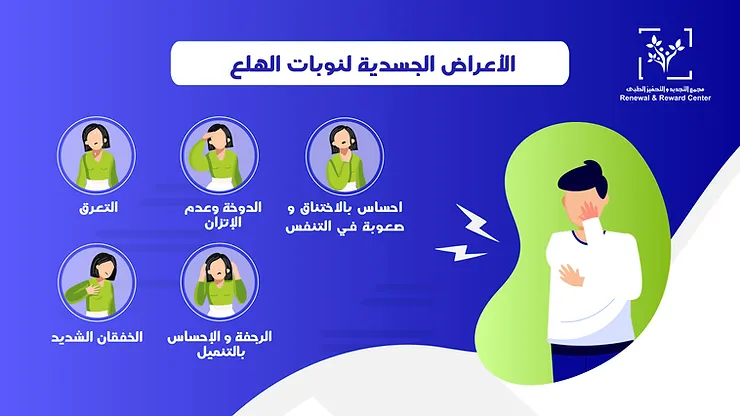What are panic attacks?
It is a group of symptoms during which a person feels a sudden state of fear and discomfort accompanied by a group of physical symptoms such as:
Severe palpitations, shivering, a feeling of suffocation or stifling, difficulty in breathing, sweating, dizziness and unsteadiness, a feeling of tingling or numbness, hot or cold flashes. There are also some thoughts associated with the seizure, often the fear of losing control, the fear of death, and the sense of detachment from reality.
The duration of the seizures
It is usually simple and limited, not exceeding 30 minutes, but many feel that it is longer, as it is usually followed by bouts of anxiety about the panic attack or the explanation for its occurrence.
Some attacks may occur unexpectedly without warning (unexpected seizures), and are characterized by a fear of losing control or a sense of death and a desire to escape. When these seizures occur, the subconscious mind links them to other influences that have nothing to do with them, such as the place where the seizure occurred or the activity that the person was doing, so they turn from unexpected seizures into situational seizures, which are seizures that occur as a result of or after a frightening or disturbing situation (situational seizures). Such as a seizure inside the mall if the person suffers from fear of open spaces, for example.
How are panic attacks diagnosed?
If more than one panic attack occurs.
Having a state of anxiety about having a seizure or other seizures.
A change in general behavior, such as resorting to avoidant behaviors (such as avoiding going to certain places where the person expects the seizure to occur) or safety behaviors (such as not going to a certain place unless in the presence of another person or group of people).
Often, a person with panic disorder, after the occurrence of the first attack, focuses on physical symptoms such as rapid heartbeat or dizziness, and links them to a specific disease such as blood pressure or heart problems. of medical examinations.
How to deal with panic attacks:
Knowledge is one of the best methods that usually enable us to deal with all kinds of problems. Knowing what panic attacks are and what are the triggers that stimulate their occurrence helps a lot in dealing with them.
As for the time of a panic attack, it is better not to resist it or try to escape from it. On the contrary, it is preferable to deal with it as a non-dangerous matter with a little deep breathing and sitting quietly. Not focusing on the symptoms, as well as to reduce the emergence of anxiety attacks associated with panic attacks or other panic attacks and resist the so-called fear of fear. Exercise, sleep, and healthy eating are generally necessary to combat any psychological problem
In the event that it is difficult, it is preferable to go to specialists from psychiatrists or psychotherapists to provide the required assistance, and treatment usually includes a mixture of psychological and pharmacological treatment, so the treatment depends on the severity of the seizures and the extent of the patient’s response, so that the treatment plan includes cognitive behavioral therapy, and in many cases the patient needs to use of antidepressants or antidepressants.
This article was written by
Rejuvenating and stimulating complex
Psychologist
Mona Bakhit
Book a psychological consultation with your psychiatrist now






